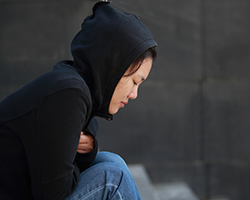[op-toc]
About Oxycodone Abuse
Oxycodone is a powerful opiate popularly used to cope with mild to moderate and post-operative pain. The misuse or illicit use of oxycodone contributes substantially to the growing prescription drug epidemic.
Oxycodone is available by prescription as OxyContin and, additionally, is marketed in combination with acetaminophen under the trade name Percocet.

Immediate Effects and Adverse Effects of Oxycodone Use
Oxycodone is an opioid narcotic, which means that it dulls pain while slowing down brain activity. At sufficiently high doses, it can be extremely dangerous even with your first use.
Most users, though, start with relatively small doses, steadily escalating as their addiction grows stronger. Some of the effects you can expect with your first high include:
- Dulled physical and emotional sensations; you may suddenly find yourself less concerned with things that troubled you earlier in the day.
- Euphoria.
- Hallucinations, at high doses.
- Lack of motivation, difficulty concentrating, and slow movement.
- Decreased coordination.
- Poor judgment.
- Anxiety.
- Listlessness.
- Slowed respiration and heart rate.
- Changes in appetite and sleeping pattern.
- Unpredictable mood changes.
Some prescription users develop an addiction after prolonged use of the drug, or as a result of taking a dose higher than that recommended by their doctor.
It doesn’t matter if you have a valid medical prescription; anyone can become addicted to oxycodone, so it’s critically important to talk to your doctor about how the effects of oxycodone impact your life.
Long-Term Effects
The longer you use oxycodone, the more likely you are to become dependent on its effects, and eventually find yourself addicted. Even if you’re not a regular enough user to develop an addiction, though, you can face a bevy of unpleasant symptoms, including:
- New or worsening mental health symptoms, most notably depression.
- Detachment and disinterest in things you once cared about.
- Accidentally overdosing.
- Changes in appetite and sleep patterns.
- Problems in your relationship.
- Loss of intelligence and memory.
- Permanent brain damage.
- Changes in personality.
- Cardiovascular problems.
- Slowed respiration.
- Decreased immunity.
- Skin and nail health issues.
- Pregnancy complications: Oxycodone can cause miscarriages and stillbirths, as well as birth defects and premature labor. Unsurprisingly, it can also compromise your ability to be a good parent.
Cravings

In the early days of an oxycodone addiction, cravings may be easy to ignore—mildly nagging at you, like a craving for a piece of pie or bag of chips. But as the addiction worsens, the cravings become so intense that they can overtake your entire life.
Tolerance
If you’ve ever had the experience of getting drunk on your 21st birthday, only to hold your alcohol much better a few years later, then you already know about tolerance. Your body reacts to mind-altering substances by subtly changing the way you react to them, steadily reducing the intensity of the high you experience.
Most users react to tolerance by steadily upping their dose, exposing them to the dangers of an accidental overdose, not to mention chemical dependency.
Dependence
Dependency is the process whereby your body becomes physically dependent on oxycodone. When you attempt to stop using, you may experience difficult, unpleasant withdrawal symptoms as your body does everything in its power to get you to use. Because oxycodone is an opiate, the chemical dependency it can cause is unusually intense.
Withdrawal
Withdrawal is an intense physical and psychological experience that makes it nearly impossible to focus on anything else.
Withdrawal is more than just a drug craving. It’s an intense physical and psychological experience that makes it nearly impossible to focus on anything else. Oxycodone and, indeed, most opiate withdrawal can consist of symptoms such as:
- Intense body aches and pains.
- Gastrointestinal distress.
The uncomfortable symptoms of oxycodone withdrawal are what keep many users hooked, even in the face of painful addiction-related consequences.
Call 1-888-993-3112Who Answers? to speak with a caring treatment advisor about how oxycodone abuse rehabilitation can restore your health and well-being.
How Addiction Changes Your Life
 Get Support with NA
Narcotics Anonymous helps people suffering from addiction to oxycodone and other drugs. Find a local meeting today.
Get Support with NA
Narcotics Anonymous helps people suffering from addiction to oxycodone and other drugs. Find a local meeting today.
Oxycodone abuse has skyrocketed in rural areas and in some regions, can even serve as a status symbol. This can complicate the recovery process, leaving addicts to worry about how quitting oxycodone may affect their lives.
Because oxycodone is an opiate, over time it also tends to produce intense apathy and depression, potentially causing you to make dangerous—and potentially irreversible—decisions.
Oxycodone addiction doesn’t just change your life; it becomes your life. When you grow dependent on a chemical substance, you’ll do just about anything to get another fix (which, in the case of opiate dependency, can come from street drugs like heroin, that have similar highs).
This can impede your ability to have healthy relationships and a good career, in addition to forcing you to deal with the following consequences:
- Health problems such as high blood pressure or unexplained aches and pains.
- Difficulty concentrating without oxycodone.
- Scheduling your life around oxycodone use.
- Arrest, incarceration, lawsuits or loss of a professional license.
Oxycodone Addiction and Mental Health

On television, people with mental illness are “crazy.” In the real world, though, they’re your family and friends. More than a quarter of the U.S. population struggles with a mental health issue at any given time, and the stigma of mental illness—not to mention the challenges of finding appropriate treatment—can be profoundly demoralizing.
Some people turn to oxycodone to dull the pain, or as a coping tool when other treatments fail. Prolonged use of oxycodone, though, can sap your brain of its ability to produce and process dopamine, a neurotransmitter associated with reward and motivation.
Though quitting helps reverse this process, the reversal won’t happen overnight, which means that oxycodone users may experience depression for quite a while after quitting.
For others, oxycodone causes intolerable life circumstances that lead to painful mental health symptoms. If you make risky decisions under oxycodone’s influence, for instance, you could be victimized and end up with PTSD.
When you’re trapped in a cycle of mental illness and addiction, it can feel nearly impossible to break free of either, let alone both. Treatment can and does work everyday, however. With a bit of commitment and a willingness to admit you have a problem, you can get clean and live a happy life.
Speak to a treatment support advisor about oxycodone addiction recovery programs at 1-888-993-3112Who Answers?.